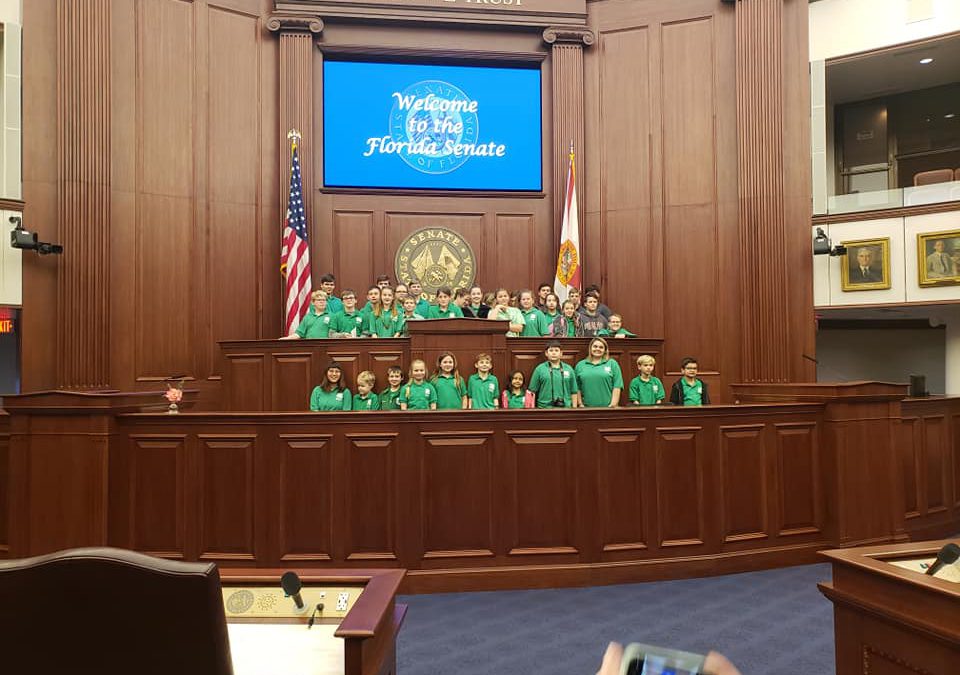
by Rachel Pienta | Feb 7, 2020
On January 30th, over 900 4-H youth and parents converged on the Florida Capitol. The hallways were filled with youth dressed in green polo shirts. The delegation represented the more than 208,000 4-H members, ages 5-18, through 4-H clubs, 4-H camps and school enrichment programs across the state.
Youth Advocacy in Action
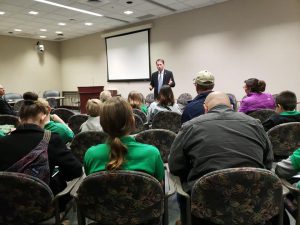
Representative Jason Shoaf addressed youth from Franklin, Liberty, and Wakulla counties.
The annual Day at the Capitol offers youth the opportunity to develop a better understanding of how government functions and to practice advocacy skills representing 4-H during meetings with Florida’s governor and legislators.
During the visit, 4-H’ers and their families have the opportunity to educate members of the Florida Legislature about the effect 4-H participation has on the lives of Floridians throughout the state. 4-H offers a robust array of programs that include the Tropicana Public Speaking Competition, residential camps, STEM education, and projects in a number of interest areas that range from citizenship to financial management, and agriculture, among others.
A Full Day of Exciting Activities
The day began with a greeting from the Florida Department of Agriculture and Consumer Services. Deputy Commissioner Deborah Tannenbaum addressed the sea of 4-H green in the Capitol courtyard. After the opening ceremonies, 4-H youth and families dispersed to begin their day of advocacy and meetings with legislators. This year, 4-H delegates focused on advocating for educational center improvements for the three residential education centers statewide commonly referred to by youth as “camps,” which all youth in all 67 counties have opportunities to attend programs at.
Other activities throughout the day included tours of the Senate and House chambers where 4-H youth engaged in mock debates and learned how their elected officials follow an official process to move up or down on proposed legislation. Youth also had the opportunity to engage in a scavenger hunt for stickers that had them searching for specific offices and landmarks throughout the Capitol complex. Many youth were also tracking their steps as part of a wellness challenge and recorded several miles of walking during the day. Other highlights of the day included taking in the view from the 22nd floor of the Capitol and touring the Old Capitol Museum.
All in all, it was another engaging experience for our 4-H youth and families to experience. If you would like to learn more information about this program or other great 4-H programs in your county, please contact your local UF IFAS County Extension Office, or visit http://florida4h.org.
Additional Resources
by Rachel Pienta | Nov 8, 2019
Quincee Messersmith serves as the Wakulla 4-H Advisory Council chairwoman and as co-leader of the 4-H IncrEdibles Cooking Club. When she is not volunteering with Wakulla 4-H, her duties as a Wakulla County Commissioner keep her busy.
This devoted volunteer and public servant is a wife, mother, and a cancer survivor. There are few events in Wakulla where Quincee cannot be found making a difference. She is just as likely to don an apron to wash dishes in the kitchen as she is to be acting as mistress of ceremonies.
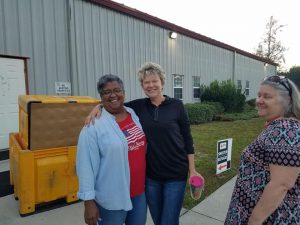
Quincee, along with other 4-H volunteers distributed supplies after Hurricane Michael.
What is a role model?
According to Quincee, “A role model is someone who shows passion and inspires, has a clear set of values, demonstrates commitment to the community, is selfless and accepts others, and has the ability to overcome life’s obstacles.” Quincee believes role models can make a big difference in a child’s life. She believes that “role models, like goals, can truly be the emotional or intellectual bridge to a child’s future. A child who finds an adult who “lives-out” the selfless image they portray, and who engages in hands-on activity with that child to help them accomplish something by their own efforts, no matter how simple, then has a mental picture of whom they want to be when they grow up.”
Why Volunteer with 4-H?
In Quincee’s own words, “Children need direction, discipline, leadership and something positive to guide their lives and to help them pick the right path as they go and grow.”
Quincee believes that the youth in 4-H programs are no different from youth involved in any other service club. Each has different passions and interests, and each also has different economic structures and parental involvement..”
She explained, “The common goal for me with regard to being a 4-H role model is that we all are in need of an adult or mentor to whom we can look to for help and direction. If children find someone assisting them at their level that has a community reputation for leadership, someone who is involved at high levels of neighborhood activity and the daily conversations of their communities, they are not only interested, but also often fascinated. Situations such as this can make the positive difference in a child’s life.”
Living the 4-H Way
The four “H’s” have inspired Quincee in her approach to service and being a role model.
She said, “for me personally the 4-H Head, Heart, Hands and Health embodies something that we could all use more of in our lives, I believe that concentrating on these four H’s can help make our communities stronger and more sustainable for the future
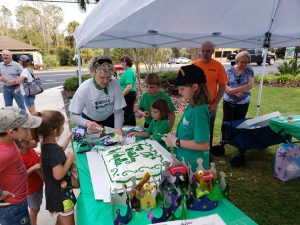
Quincee led 4-H youth in serving cake at the county’s founding day celebration on “Wakulla Wonderful” Day.
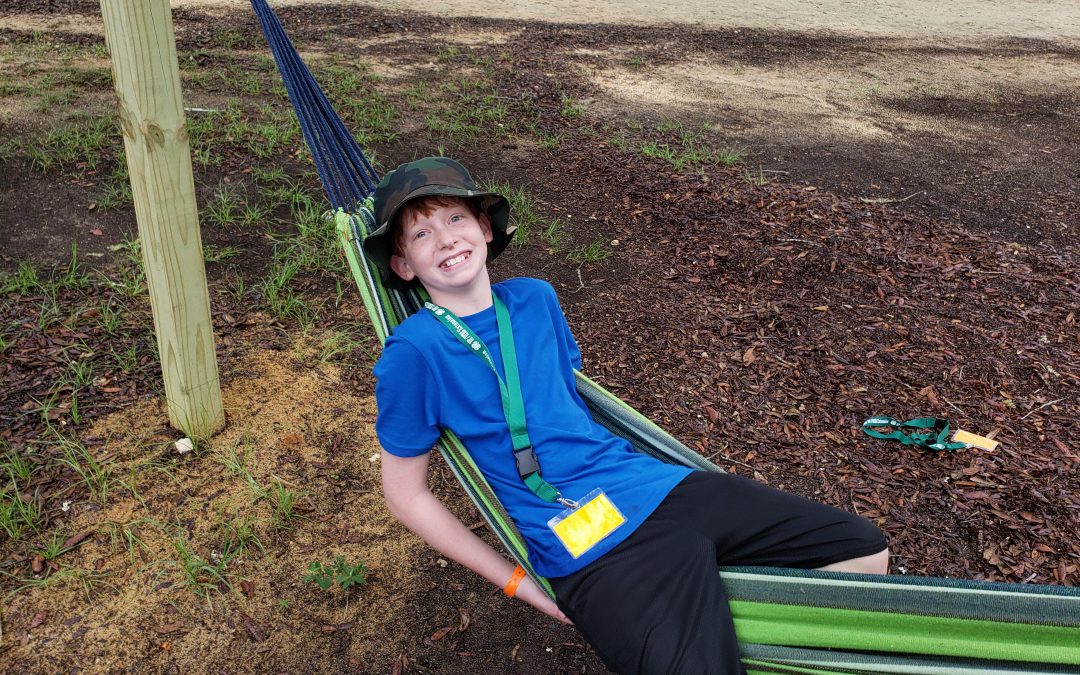
by Rachel Pienta | Jul 19, 2019
Exploring New Activities with 4-H Club and Camp
When Chase Weston arrived at a meeting of the Panacea 4-H Explorers Club for the first time, he was not sure he wanted to be there. Chase’s normal activities of choice included reading and playing video games. He rarely played with other children and did not usually enjoy playing outdoors.
The Panacea 4-H Explorers Club meets weekly and offers youth the opportunity to sample activities ranging from painting and cooking to outdoor skills. Members march in parades and volunteer together at community events.
Getting Active With Archery
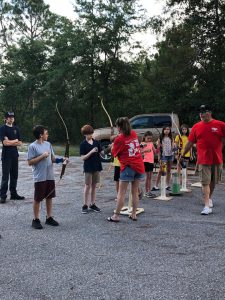
Chase receives archery instruction from Club Leader Trena Gooding.
From that first day attending an Explorers Club meeting, during his time with 4-H, the once very reserved and quiet boy has undergone a dramatic transformation. This summer, Chase had the opportunity to participate in a two day archery summer camp. On the first day, he did not want to participate and asked to go home. On the second day he started to warm up to archery and by the end of the day he did not want the camp to end!
Club Leader Rhonda Lundy said, “I have seen a drastic change in Chase through his participation in 4-H. He is definitely trying things outside his comfort zone and his parents couldn’t be happier.” Chase accepted the opportunity to attend Camp Timpoochee with support from a 4-H state scholarship. During his week at camp, Chase enjoyed activities like dance class and kayaking. He was able to continue with his newfound love for archery during residential camp.
Happiness in a Hammock at Camp
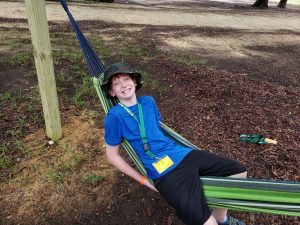
Chase enjoys free time in a hammock at Camp Timpoochee.
While he has stepped outside his comfort zone and tried many new activities during the week, Chase declared his favorite thing at Camp Timpoochee was enjoying the view from the vantage point from one of the many hammocks strung between trees throughout camp.
Links to Resources
For more information on how your family can participate in 4-H, find your local UF IFAS Extension Office and contact your 4-H Agent to explore what programs are offered in your area.
Benefits of Summer Camp
Camp Choices with 4-H
Youth Development Outcomes of Camp Experiences
by Rachel Pienta | Jun 7, 2019

Hurricane Michael was the first ever Category 5 hurricane on record to impact the Florida Panhandle.
Are you ready? The 2019 Atlantic hurricane season began June 1. The official hurricane weather season continues until November 30, 2019. For Florida residents, it is never too early and not too late to prepare for this year’s hurricane season. NOAA’s Climate Prediction Center released a forecast prediction reporting a 40% chance of a “near-normal” Atlantic hurricane season and a 30% chance “above normal” indicating a range of 4-8 hurricanes, including 2-4 hurricanes of category 3 or higher. With this information provided as a means to increase disaster preparedness awareness, it is imperative that our families take action now to minimize the anxiety, stress, and hardships that occur when a disaster strikes. The following information details three family-friendly disaster preparedness activities to complete during the month of June to be hurricane ready for the 2019 season followed by useful informational links.
Build a Disaster Preparedness Bucket
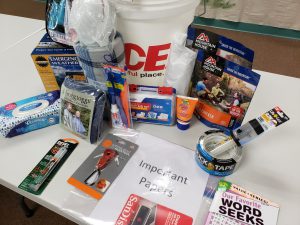
The contents of a disaster bucket assembled by Wakulla County Emergency Management Director Jennifer Nagy.
One annual activity that families can do together is “build a disaster preparedness bucket.” Families may prepare large plastic storage containers with lids for hurricane snacks and other necessary items. In a storm situation where conditions may require you to move to safety, preparing a 5 gallon bucket with a lid full of recommended essential items will provide a portable, easy-to-store alternative that the whole family can use. Buckets may be purchased at local hardware or home improvement stores. In your area, organizations like your local city or county emergency management department or the Red Cross may offer a bucket giveaway program with pre-stocked disaster preparedness kits.
Talk About Your Communications Plan
As a family, decide who will be the point of contact for all members to contact in case of emergency. This activity is an excellent way to engage your child in critical thinking and problem solving. The person or people should be located outside the impacted area – a grandparent or other relative or family friend in another state would be one possibility. Provide each family member with a laminated contact list – with emails, phone numbers, and addresses – that can be kept in disaster preparedness kits, saved in phones, or stored in wallets and backpacks. Local business supply stores, mail or copy centers in your area may offer laminating services to make waterproof contact lists for safe storage and easy reference.
Have a “Meals To Ready” Taste Test Dinner
After a disaster, your family may be without power for several days or longer. To enjoy safe, hot meals, one option is “meals ready to eat” also known as MREs. MREs are a complete, filling & nutritious way to feed your family. MREs can be purchased online or in the camping section of stores like Bass Pro or Wal-Mart. These meals have a long shelf life and can be stored for months until needed. Some MREs include built-in heaters while others require boiling water to prepare. Camping MREs tend to be an entrée only. Military style MREs will have most, if not all, of the following components: entrée, side dish, bread, spread, dessert, cold drink mix, instant coffee, spoon, condiments, napkin, moist towelette, and a flameless ration heater.
Completing an MRE taste test as a family planning activity will help you determine which products your children will eat when the time comes to use the MREs. The taste test can be fun for the whole family – have everyone taste and then rate each meal or meal component on a scale of 1 to 5 – with 5 being the best possible in flavor and food quality. When you get ready to purchase a supply of MREs, you will know whether your family is going to prefer lasagna to white chicken chili and can shop with confidence!
For more information about hurricane season preparation or 4-H programs in your county, please contact your local UF IFAS County Extension Office, or visit http://florida4h.org.
Resources
by Rachel Pienta | Apr 26, 2019
People choose to volunteer for a multitude of reasons. In the case of Wakulla County 4-H volunteer Greg James, there seem to be few reasons why he wouldn’t want to volunteer to meet a need in his community – especially if it helps youth.
Why Greg Volunteers
“Volunteering in my community is very important to me. I believe serving your community in some fashion helps create a sense of pride, belonging and ownership. I think it’s important to provide our children a positive environment in which to grow. Volunteering for 4-H allows me to foster that environment.”

Greg James joined a 4-H Club member to promote an upcoming community event.
Thirty Years of Investment
While Greg (and his wife of close to 30 years, Karen) live in Sopchoppy, there are few areas of the county where Greg’s volunteerism has not had an impact. While Greg and Karen’s children have grown up and left the county to pursue college and careers, involvement with area youth has remained a constant in his life since moving to the county in 1995.
In his professional life, Greg wears two hats – he serves as the Wakulla County Finance Director and the Deputy Clerk of Court. Some community members may know him best as the minister of the Sopchoppy Church of Christ.
On almost any given day, Greg can found serving his community – as a volunteer cross country coach, stirring a pot at a Low Country Boil charity event, cleaning up the coastline or lending time to a local civic committee. For the last two years, Greg has served in a leadership role with the Wakulla County 4-H and Extension Advisory Councils, and he started a 4-H Finance Club last summer to help local teens learn financial management skills.
Hands On Leadership
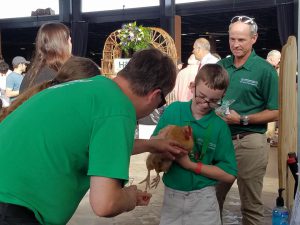
Greg observes a 4-H Poultry Club member demonstrate chicken handling at a community event.
In service to 4-H, Greg give his financial expertise and his hands – figuratively and literally. To celebrate the success of the 4-H Chicken Champs Club, he made people-sized chicken figures that have become a popular photo opportunity at 4-H events. His most recent undertaking is still in progress – refurbishing old metal bleachers by hand for the 4-H Archery Club range.
Sali Polotov, a Future Leaders Exchange Program student from Tajikistan, is a member of the 4-H Finance Club and shared his thoughts on learning with Greg as club leader. “He is a great leader and speaker. Every time I go to Finance Club, I explore something new. He explains difficult things so easily. Also, he has a great collection of foreign coins!
Greg wasn’t introduced to 4-H until his own children were growing up and completed swine projects. “Now that I know all of the great programs 4-H offers, I wish I had been more involved.”
As a volunteer leader, Greg also works to recruit more volunteers to help grow 4-H programs. His advice to anyone who thinks they might want to volunteer is simple – “Don’t wait!”
Make a Difference with 4-H – Volunteer
Greg said, “I would ask that (people) stop thinking about it and just do it! Our 4-H program depends heavily on volunteers, and what we are able to accomplish is only limited by the number and caliber of our volunteers. Please volunteer and make a positive impact on your community and our kids!”
For more information on how to become a 4-H volunteer in your community, contact your local UF/IFAS Extension Office. To see how 4-H is positively impacting the lives of Panhandle youth, follow us on Facebook.
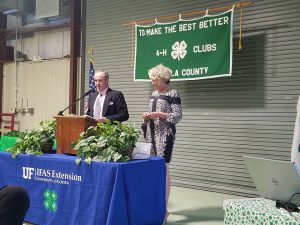
Greg James prepares to swear in new 4-H Association leaders for 2019.
Additional Resources:












